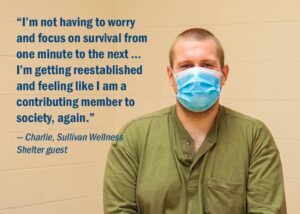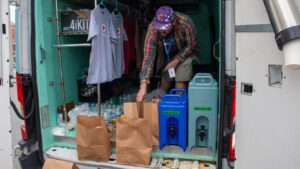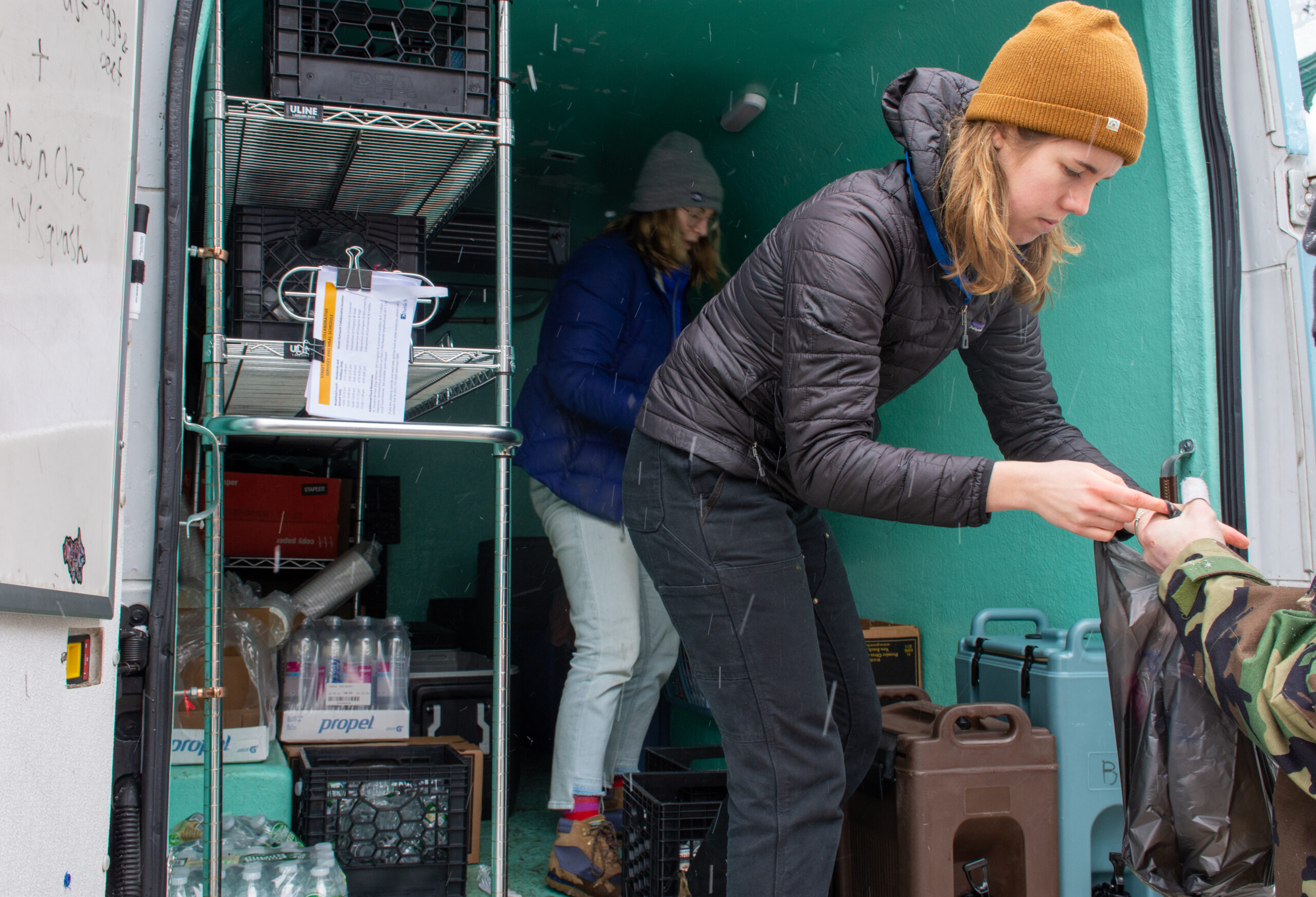No one should have to live outside, but that is what is happening to an unprecedented number of Mainers right now. In Portland, the Parks Department recently counted 102 tents set up by people experiencing homelessness — a new record for the area. The encampment on the Bayside Trail is a visual representation of the fact that we are in the midst of a homelessness crisis, a crisis that is occurring all across Maine, from Aroostook County to York. It is absolutely devastating that so many people are unsheltered, without access to basic needs like bathrooms and clean water.
It doesn’t have to be this way. Working together — meeting the needs of individuals, while also advocating at the city, state, and national levels for people who are unsheltered — we can get more people into safe and dignified shelters and ultimately, housed.
Every day, Preble Street caseworkers from the Street Outreach Collaborative (SOC) and our partner agencies see people suffering the severe physical and mental health consequences of living unsheltered. These caseworkers meet individuals, couples, and families where they’re at and work to connect them with food, shelter, housing, health services, IDs, clothing, and other resources to help them reach their goals. This caseworker outreach in the campsites, streets, and forests where people are living is an important first step to help some of the most acutely vulnerable members of our community get their lives on track.
The next important step for many, especially people who have severe physical or mental health issues and individuals experiencing chronic homelessness, is access to dignified, professionally run 24-hour shelters. At Elena’s Way Wellness Shelter, 40 people who were previously unsheltered are able to rest and recuperate without having to worry about lining up for a meal or a bed each night all while having constant access to a social worker.
James, who has been staying at Elena’s Way after living outside, recently shared with the Maine Legislature:
Now I’ve been working at Walgreens for the past six months. I feel that it’s important to give 100% to everything, and staying in Elena’s Way enables me to do that. Having shelter and a job has encouraged me to stay sober, to prioritize my ability to work, and make changes for myself. I encountered a lot of stigma before when I was staying outside. When you’ve got a job and you’re homeless—you can’t do simple things like taking a shower before work or showing up with clean clothes every day. Now that I am getting my basic needs met, I don’t have to worry about being judged at work, or where we will get our next meal. Every day I get good rest and food. I have consistent support from the staff. That I can feel. I have stability. Instead of worrying, I can focus on self-growth, working on finding inner strength, and transforming my habits."
The changes we’ve seen from clients staying at Elena’s Way have been nothing short of amazing. As Henry Myer, Elena’s Way Director explains, “The transition into housing can be tough, so shelter can be a helpful stepping stone, especially for someone who has been chronically homeless and living outside.” But without more shelters like Elena’s Way throughout the state, only a very limited number of the thousands of homeless Mainers have access to this type of support. In the meantime, hundreds of people are left living outside in unsafe conditions and in encampments like the one on the Bayside Trail.
For years, Preble Street and social service providers across Maine have seen the devastating health consequences of homelessness. Our partners at the National Health Care for the Homeless Council (NHCHC) recently released a study showing that continuous displacement by encampment sweeps leads to even higher rates of mortality, overdoses, and hospitalizations. “We have seen a national trend of increased unsheltered homelessness,” says Courtney Pladsen, Director of Clinical and Quality Improvement at NHCHC, study co-author, and a Maine provider. “This study indicates that encampment sweeps are the wrong approach to this crisis. We must provide street medicine, medical outreach, substance use treatment, and harm reduction services, as well as focus on addressing the heart of the issue — these individuals need housing, not ongoing displacement. Too many individuals are losing their lives due to bad policy.”
With this unprecedented rise in unsheltered homelessness in Maine, we are asking you to help educate and engage your friends, co-workers, and neighbors to build the momentum for the system-change we need to help our most vulnerable community members. Funding well-run and professionally staffed emergency shelters, creating Site-based Housing First programs to support people who are chronically homeless, and expanding treatment programs for people with substance use and other mental health disorders are the key solutions that will provide people with the safety and dignity we all deserve.

Five Years Later: How Preble Street’s Response to COVID-19 Shaped Its Future
During our 50 years in operation, Preble Street has had to adapt to changing needs and a shifting landscape many times. Never was this truer than in the days, months, and years that followed March 16, 2020. Five years ago this month, while the world was urged to stay home, a question loomed over staff

A feeling of home sweet home
[A meal] is so comforting. It’s a feeling of home sweet home. There have been times when I’ve been hungry for so long and struggled for so long that I had a hard time digesting food… I know people that have gone without food so long that having a plate of food in front of

Two years of impact at the Elena’s Way Wellness Shelter
October 2024 marks two years of service to vulnerable community members experiencing unsheltered homelessness at the Elena’s Way Wellness Shelter. Since opening its doors, Elena’s Way has provided over 18,000 bed nights to individuals experiencing homelessness. That represents more than 18,000 times that a person has been able to sleep inside a warm, safe, and dignified shelter environment instead of

